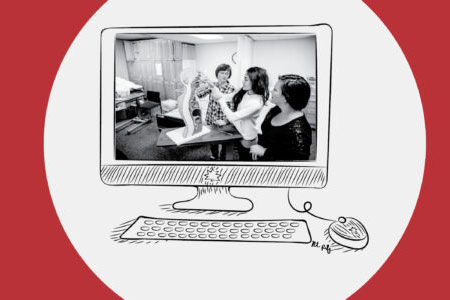This year, Goshen College is partnering with Mennonite Central Committee to offer SST-alternative courses in the form of a year-long series on global public health.
The Global Health Virtual Practicum, as the series is being called, will cover a wide variety of global health issues, including projects done in partnership with organizations around the world.“Over the year we will be working with a wide variety of MCC’s partner organizations from around the world,” said Paul Shetler Fast, MCC’s Global Health Coordinator and one of the organizers of the practicum.
Fast ‘08 and his wife, Rebecca Shetler Fast, have been awarded the 2020 Young Alumni Servant Leadership Award for their work with marginalized people through MCC.
“In the first semester alone, we will be connecting with partners in Zimbabwe on COVID-19, cholera and how these intersect with issues of gender and culture…” Fast said.
In addition, participants will connect with parts in Haiti, in Afghanistan and Nepal. in the U.S. and Canada, and Chad.
The classes will be held on Saturday mornings, via Zoom starting on Oct. 5. Additional classes will be offered in the spring and May terms, with the practicum ending sometime in June.
There are currently 14 participants enrolled: five from Goshen College and nine from MCC’s international program including participants from Nepal and Thailand.
“I’m really excited about how they’re going to get some good experiences in global health doing real world projects,” said Jan Bender Shetler, director of international education.“They’re going to think about how to work in cross-cultural groups to do a job.”
The course is being taught by Shetler Fast and Wade Snowden, MCC’s Serving And Learning Together (SALT) Coordinator.
Snowden’s role will be to orient the group to MCC’s values and service-through-partnership model, as well as leading the group’s reflecting and team building processes.
“I was amazed at how quickly it all came together and the strong interest both at GC and around the world through MCC,” Shetler Fast said.
It was Shetler Fast who had the idea to try and develop a program that would allow participants in MCC’s gap-year-abroad programs for young adults, SALT, Young Anabaptist Mennonite Exchange Network (YAMEN) and the International Volunteer Exchange Program (IVEP), to remain involved in MCC despite being unable to travel due to the COVID-19 pandemic.
“[Shetler Fast]… has connections all around the world and all the countries that Mennonite Central Committee works at, who are doing projects in global health, public health kinds of things like sanitation and water and maternal-child health care… He wanted to figure out how to connect these young people with these programs,” Bender Shetler said. “Then as we talked about it, it became more like an academic teaching program.”
From there, it was decided to try and partner with a Mennonite college so that students could get college credit for participating in such an academic program.
“And I said, ‘yes, please!’” Bender Shetler said. “For us too, we were looking for opportunities for students who couldn’t go on SST this year, to do something virtual or local and this seemed to be a possibility for our students, especially those interested in a career in health … where they could actually see this applied to these contacts, all around the world.”
It was this application of learning that drew Joe Wheeler, senior biochemistry major. to the class.
“I was going to do SST in Senegal, but due to the pandemic, that was cancelled, so I was looking for different ways of doing the SST alternative classes,” Wheeler said.
As someone who has done work with MCC before, Wheeler was also drawn to the aspect of being able to practical work with MCC partners in other countries.
“I’m really interested in getting an introduction into global health from an organization that does international relief and development,” he said.
For Zenton Yobera, a senior with an interdisciplinary major in nursing, psychology and public health, the practicum offers a chance to learn about perspectives in public health outside of the European and American points of view.
“I’m very interested in public health, and the fact that we’re studying it globally sounds even more interesting,” Yobera said.
For sophomore English major Greta Lapp Klassen, her work at a local community health clinic this summer inspired her to sign up for the practicum.
“[I found] that it was really interesting — the work that was being done — because the clients there were people who don’t have health insurance… so I was interested in how people get healthcare when they don’t have resources and I felt like this class was sort of like that,” she said.
Shetler Fast is excited to “get to share this conversation and experience with such a diverse and passionate global cohort of students from Goshen and around the world,” he said.
“Public health is something that we are all part of and have a role to play in,” Shetler Fast said. “We need not see ourselves as above or separate from the issues we are discussing of the people impacted… Global health as a field comes with a troubled history of colonialism, racism and sexism and we need to be mindful of this history and its legacies if we are to make progress in decolonizing health and writing a better future.”
With the start of the practicum just around the corner, those at GC are eager to begin.
“It’s a pilot for us and it’s a pilot for MCC. If it works, they might do them other years [on other topics as well],” Bender Shetler said.


